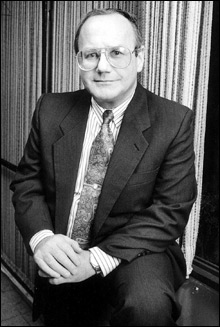
LION OR LAMB? Ever controversial Southie pol Jim Kelly died of cancer this week.
|
Consider, for a moment, two of the many compliments paid to South Boston political icon Jimmy Kelly following his death from cancer Tuesday morning. Boston mayor Tom Menino termed the district councilor from Southie “a true gentleman, a man of his word whose convictions always came from the heart.” And at BostonHerald.com, Jack Hart, Southie’s state senator, called Kelly “a man of velvet and steel. He was as tough as nails when he had to be but was gentle as a lamb when relating to people that were disenfranchised or needed assistance.”
Let’s start with Menino’s comments — and let’s accept the mayor’s suggestion that Kelly’s convictions were utterly sincere. That doesn’t mean they were right. As noted in the Globe’s fine obituary, which was written by Brian MacQuarrie and Andrew Ryan, Kelly frequently stoked race-based enmity in his hometown. (Those are my words, not theirs.) In the ’70s, as a community activist, Kelly made his name battling busing; in the ’80s, as a Boston city councilor, he fought against the integration of Southie’s public housing; a couple of years ago, when I covered the council for the Phoenix, Kelly was still railing against anti-white racism. What’s more, Kelly staunchly supported excluding gay and lesbian groups from Southie’s veteran-sponsored St. Patrick’s Day parade in the early 1990s — a position which, though ultimately affirmed by the US Supreme Court, was homophobic to the core. (Menino’s current loyalty among the gay electorate stems, in part, from his decision to boycott the Southie parade early in his mayoral tenure.)
Hart’s remarks are interesting for two reasons. First, saying that Kelly was “tough as nails when he had to be” amounts to an endorsement of every fight Kelly picked over the years. What’s more, the characterization of Kelly as a “lamb” to the vulnerable depends on a very narrow definition of whom, exactly, the vulnerable are. In April 1976 — a couple weeks after Ted Landsmark was brutalized on City Hall Plaza during an anti-busing gathering — Kelly, then head of the South Boston Information Center, refused to participate in a “Procession against Violence” that featured, among others, Senator Ted Kennedy, then-mayor Kevin White, and then-senator Ed Brooke, the first African-American elected to the US Senate. According to Kelly, his non-participation was a swipe at the liberal establishment for supporting busing to integrate Boston’s schools. That was one way to read it.
None of this means Kelly shouldn’t be mourned. He died too young, at the age of 66. He was remarkably attentive to the needs of his constituents, not just in South Boston, but in the South End and Chinatown as well. And he represented a vanishing culture — that of the clannish, combative Irish-Americans who dominated South Boston for more than a century. That said, his legacy is a deeply ambiguous one. Kelly was beloved among his own people. But other Bostonians can be excused for feeling differently.